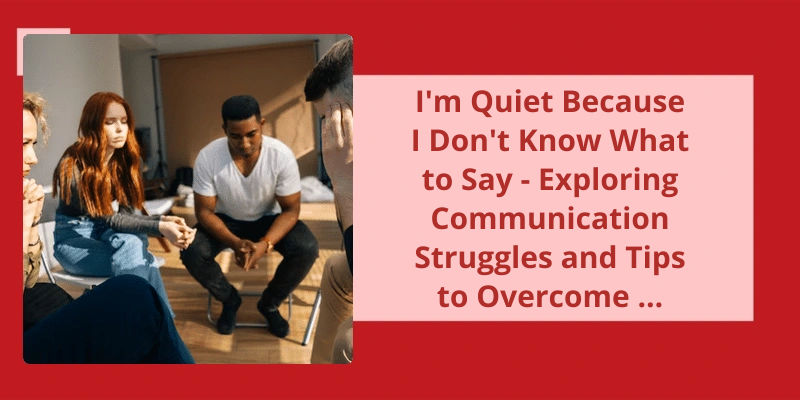Have you ever found yourself in a situation where you just don't know what to say? Maybe you're at a party and everyone else seems to be talking and laughing, but you feel tongue-tied and awkward. Or perhaps you're in a conversation with someone and you suddenly go blank, struggling to come up with anything to say. This feeling of being quiet and unsure can be overwhelming, causing you to retreat and stay silent. It's understandable why you might feel this way, but it's important to recognize that there could be underlying reasons for your lack of words. In this article, we'll explore some possible causes of feeling quiet and offer tips for how to overcome this challenge.
What to Say When Someone Asks Why You’re Quiet?
It’s common for people to ask why others are quiet or seem to be lost in thought. Sometimes this is out of concern or curiosity, while other times it may stem from discomfort with silence or a need to fill the air with conversation. Whatever the reason, being asked why youre quiet can feel invasive or judgmental at times.
One simple response to this question is to say that youre just a quiet person. Theres nothing inherently wrong with being introverted or preferring to speak less in social situations, and some people may be more understanding when you frame it this way.
Alternatively, you could say that youre a good listener. This suggests that youre paying attention to the conversation even if youre not actively contributing to it, and may make others feel more comfortable with your silence.
If you prefer to keep the focus on yourself, you could say that youre thinking about something in particular. This response is more specific than simply saying youre quiet, and may lead to further conversation if the other person is curious about whats on your mind.
Another option is to say that you zoned out or got lost in thought. This is a more lighthearted response that acknowledges your silence without making it a big deal.
For those who’re comfortable with more introspective conversations, saying that you’ve a lot on your mind may be a way to open up about whats really going on. This can be a more vulnerable response, but it may also lead to deeper connection if the other person is willing to listen and empathize.
Lastly, saying that you don’t mind silence is a way to shift the focus away from yourself and encourage others to be more comfortable with quiet moments. This can be a useful tactic if youre in a group setting and everyone seems to be talking just to fill the silence.
In any case, theres no one right answer to the question of why youre quiet. It may depend on the situation, the person asking, and your mood at the time. However, having a few prepared responses can make it easier to navigate these potentially awkward interactions and stay true to your natural tendencies.
Now that we’ve learned some tips for being less quiet and contributing more to group conversations, let’s dive deeper and explore additional strategies that can help overcome anxiety and shyness when interacting with others.
How Do I Stop Being a Quiet Talker?
As a quiet talker, you may feel like youre constantly struggling to contribute to group conversations. It can be frustrating to watch as others easily banter back and forth, while you sit there trying to come up with something to say. However, the good news is that being a quiet talker doesn’t have to be a permanent trait. There are steps you can take to become a more confident and engaging conversationalist.
Firstly, it’s important to give yourself permission to be quiet. While group conversations can be exciting, they can also be overwhelming. If youre naturally introverted or shy, it’s okay to take a step back and listen for a while. In fact, taking a few moments to process whats being said can actually help you come up with more thoughtful contributions later on.
At the same time, it’s also important to challenge yourself to speak up every so often. Set a goal for how often youd like to contribute to the conversation, whether thats once every ten minutes or once every half hour. Having a concrete goal can help motivate you to come out of your shell a little bit more.
When you do make contributions, remember that they don’t have to be long or elaborate. Even a small comment or question can help keep the conversation moving and show that youre engaged. And don’t be afraid to ask for clarification if you don’t understand something someone has said. Being curious and asking questions can help you get more involved in the conversation.
Finally, one key to being a good conversationalist is to appear engaged even when youre not speaking. Maintaining eye contact with the speaker, nodding along with what theyre saying, and even smiling can all help show that youre invested in the conversation. This can also help keep you tuned in and ready to speak up when the opportunity arises.
Give yourself permission to be quiet when you need to, but also challenge yourself to speak up a little more often. Remember that even small contributions can be valuable, and try to appear engaged in the conversation even when youre not the one speaking.
By taking the time to assess a situation before acting, quiet individuals tend to make calculated decisions that benefit them in the long run. This deliberate approach can also be advantageous when it comes to communication, allowing them to filter their words carefully and choose the right time to speak up. Next, we’ll explore some of the other characteristics and actions commonly associated with quiet people.
How Does a Quiet Person Act?
Quiet people listen more than they speak. They tend to take in what’s being said around them and process it before formulating a response. This can make them great listeners and empathetic communicators. Because they’re more introspective, quiet people often have a better understanding of their own emotions and thoughts, which can lead to a greater sense of self-awareness.
Quiet people tend to be more reserved in social situations. They may prefer small groups or one-on-one interactions instead of large gatherings. This can be mistaken for shyness or aloofness, but it’s often just a preference for more intimate settings. This can lead to a deeper understanding of social dynamics and relationship building.
Respect for personal space and boundaries is important to quiet people. They may be more comfortable with physical distance and may not engage in as much physical touch or affection as others. This doesn’t mean they don’t care or arent capable of intimacy, but it may take longer for them to feel comfortable with physical touch.
Quiet people often value their alone time and need it to recharge. This doesn’t mean they don’t enjoy spending time with others, but they may also need time to themselves to reflect and recharge. They may have hobbies or interests they prefer to do alone, such as reading or writing, and may find socializing draining if they don’t have enough alone time.
They’ve a unique perspective on the world and can bring a depth to relationships and interactions with others. While they may not always be the life of the party, they contribute valuable insights and perspectives that are worth taking the time to listen to.
Now that we’ve explored some tips on how to talk more often when you’re naturally quiet, let’s dive deeper into some additional strategies for becoming a more engaged and confident communicator. By implementing these simple techniques in your daily interactions, you can begin to overcome your shyness and start speaking up more often in social settings.
How Do You Talk When You’re Quiet?
As a quiet person, talking may not come naturally to you, but that doesn’t mean you cant improve your skills and express yourself more effectively. One way to do this is to prepare topics to talk about before entering social situations where conversation is expected. This will help you feel more confident and give you something to fall back on if youre feeling stuck. Consider topics that interest you and that others might enjoy discussing as well.
Confidence is key when it comes to talking, even if you don’t feel confident inside. Act like you’re confident by standing up straight, making eye contact, and speaking clearly. This will give others the impression that you’re someone worth listening to and encourage them to engage with you. Remember that everyone has something valuable to share, and your thoughts and opinions are just as important as anyone elses.
Body language is important in conveying your openness to conversation. Make sure to maintain an open stance, avoid crossing your arms or legs, and face the person you’re talking to. A smile can go a long way in signaling your willingness to talk and can also put others at ease. It may feel awkward at first, but try starting conversations with a smile and see how it changes the dynamic.
If you find yourself in a conversation where theres a lull, don’t be afraid to speak up. Saying something, even a small comment, can keep the conversation going and prevent an awkward silence from setting in. Quick commentaries are a great way to engage with others and show that youre interested in what they’ve to say. Asking questions can also be a good way to keep the conversation flowing.
Source: How to talk and interact with others if I keep quiet and silent …
It’s important to recognize and accept our own unique personality traits, including being quiet. In fact, silence can be a valuable asset in certain situations. Let’s explore why being a quiet person is perfectly okay in a society that may prioritize gregariousness and outgoing personalities.
Is It OK to Be a Quiet Person?
For some people, being quiet is actually a strength, rather than a weakness. It allows them to think deeply and reflect on things without external distractions. Many creative people, such as artists, writers, and musicians, have been known for their quiet nature and introspective personalities, which have helped them in producing their best work. Sometimes, it’s the quiet moments that allow us to come up with innovative ideas that can change the world.
Being a quiet person doesn’t necessarily mean that you lack confidence or have a low self-esteem. It could be an indication of your humility and introspection. Moreover, it’s important to note that people have different personalities and traits that make them who they are. As such, it’s okay to be a quiet person, as long as you’re comfortable with yourself and are able to communicate your thoughts and feelings effectively when necessary.
In some situations, being quiet can actually be an advantage. For instance, if you find yourself in a heated argument or debate, being quiet and listening carefully can help you gain a better understanding of the situation and make a more informed decision. Similarly, in situations such as negotiations or interviews, being quiet and observant can help you pick up on subtle cues and make better decisions.
In such cases, it may be necessary to work on improving your communication skills and becoming more assertive in order to achieve more balance in your life.
The most important thing is to understand and accept yourself for who you are, while also being aware of the advantages and disadvantages that come with your personality traits. Ultimately, the key to finding happiness and success in life is to embrace both your strengths and weaknesses, and strive to improve upon them when necessary.
Tips for How to Navigate Social Situations as a Quiet Person, Such as Networking Events or Parties
- Prepare in advance: Practice what you want to say and possible conversation starters in your head so you feel more comfortable in the moment.
- Find a wingman: If possible, attend social events with a friend or acquaintance who makes you feel more at ease.
- Take breaks: If you feel overwhelmed, take a break in the restroom or step outside for a breath of fresh air.
- Listen actively: Rather than worrying about what you’ll say next, focus on really listening to the other person. They’ll appreciate it and it will take pressure off of you to constantly contribute to the conversation.
- Participate in group activities: If there’s a group activity or game, participate. It’s an easy way to break the ice without feeling like you’ve to come up with small talk.
- Set realistic expectations: Don’t feel like you’ve to be the life of the party. It’s okay to take it easy and have a low-key night.
Conclusion
Being quiet isn’t necessarily a bad thing, especially when one is unsure of what to say. In fact, it can be a sign of thoughtfulness and mindfulness. Taking a moment to consider one's words before speaking can be a valuable skill, as it allows for more intentional and meaningful communication. However, it’s also important to recognize the potential downsides of being consistently quiet, such as missed opportunities for connection and contribution. Ultimately, finding a balance between quiet observation and open expression is key to effective communication and personal growth. Instead of feeling ashamed or judged for being quiet, embrace it as a valuable aspect of your personality and use it as an opportunity to learn and grow in your communication skills.






